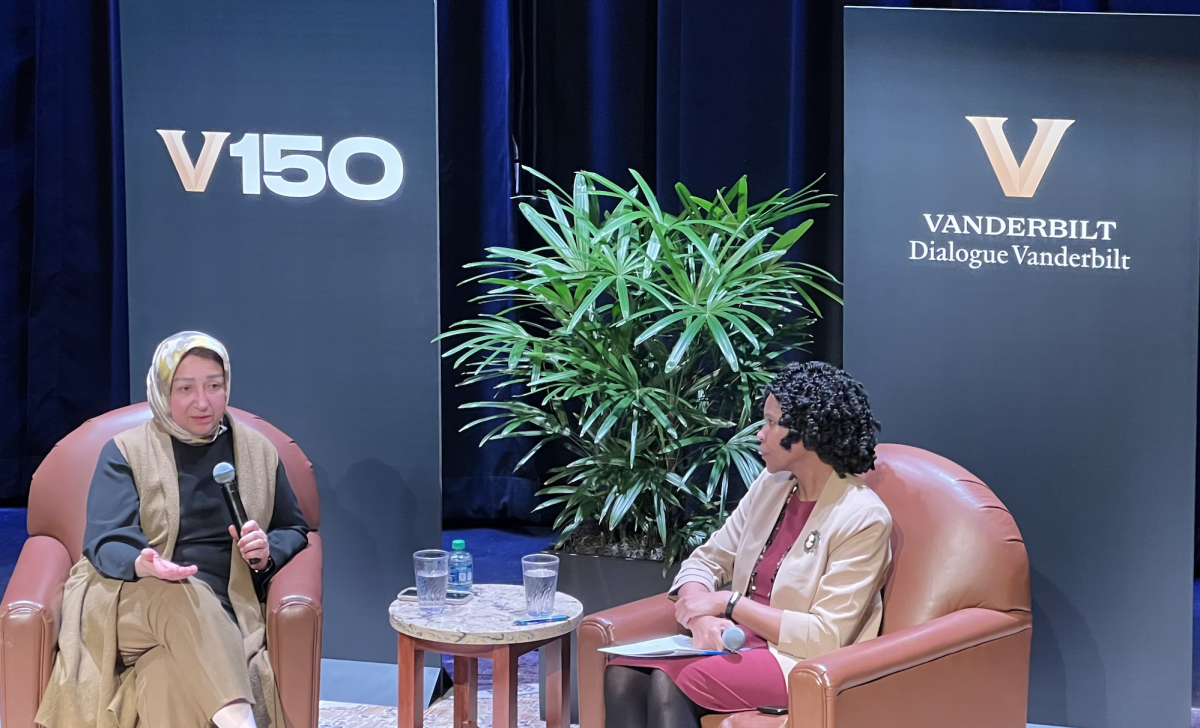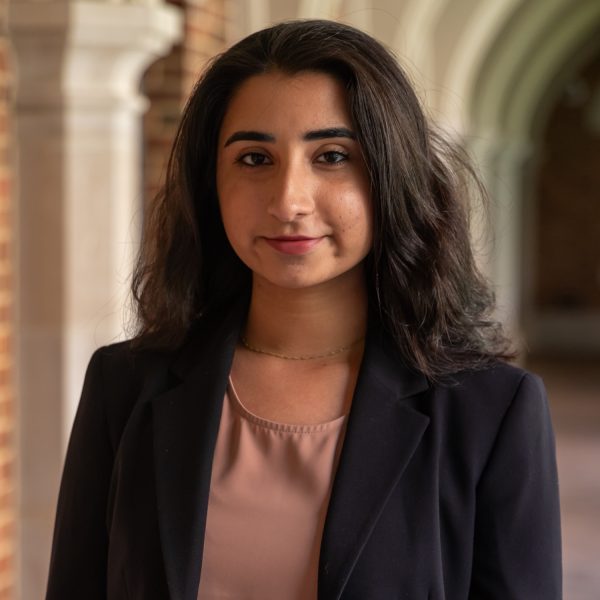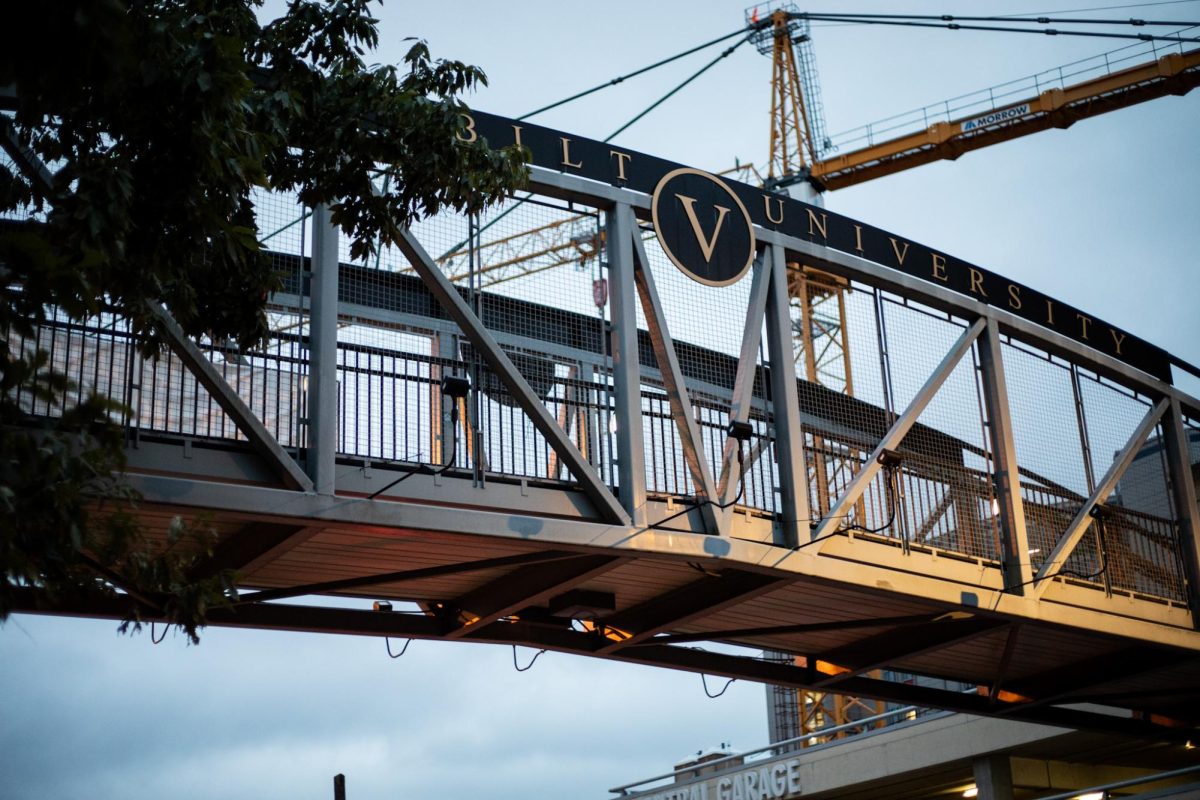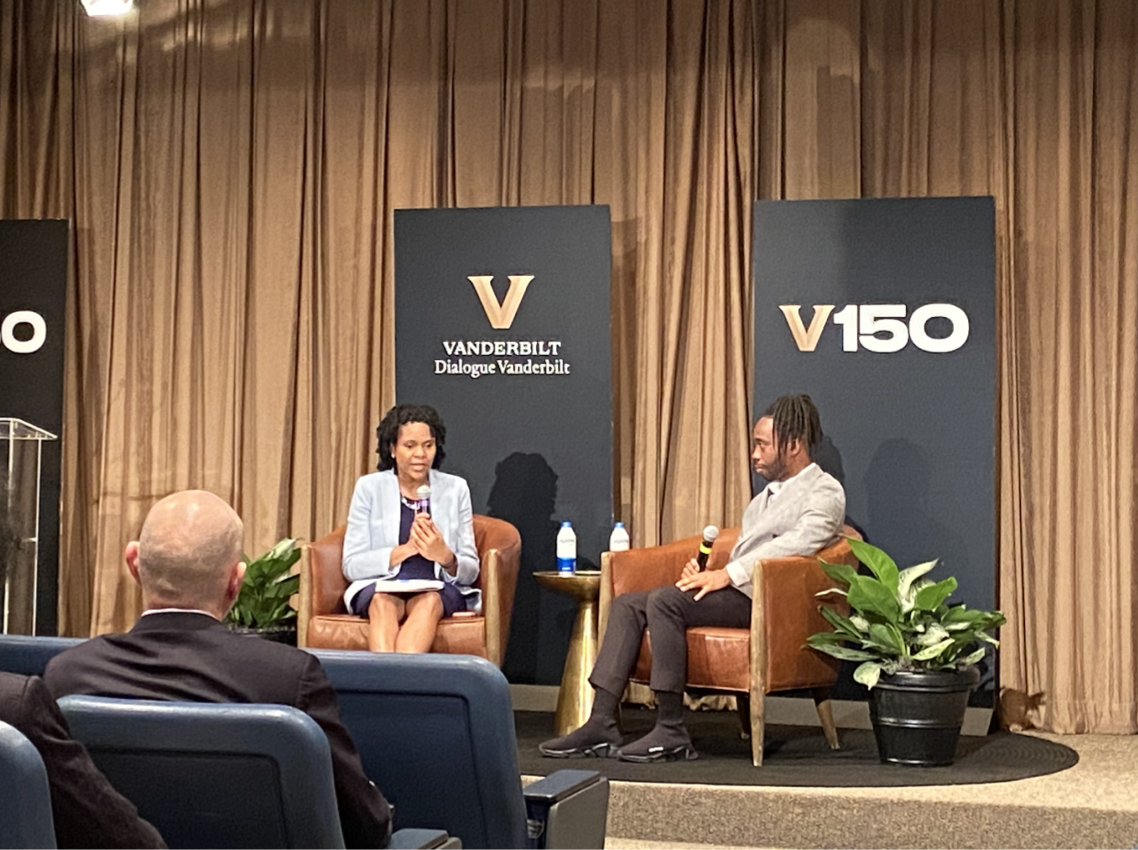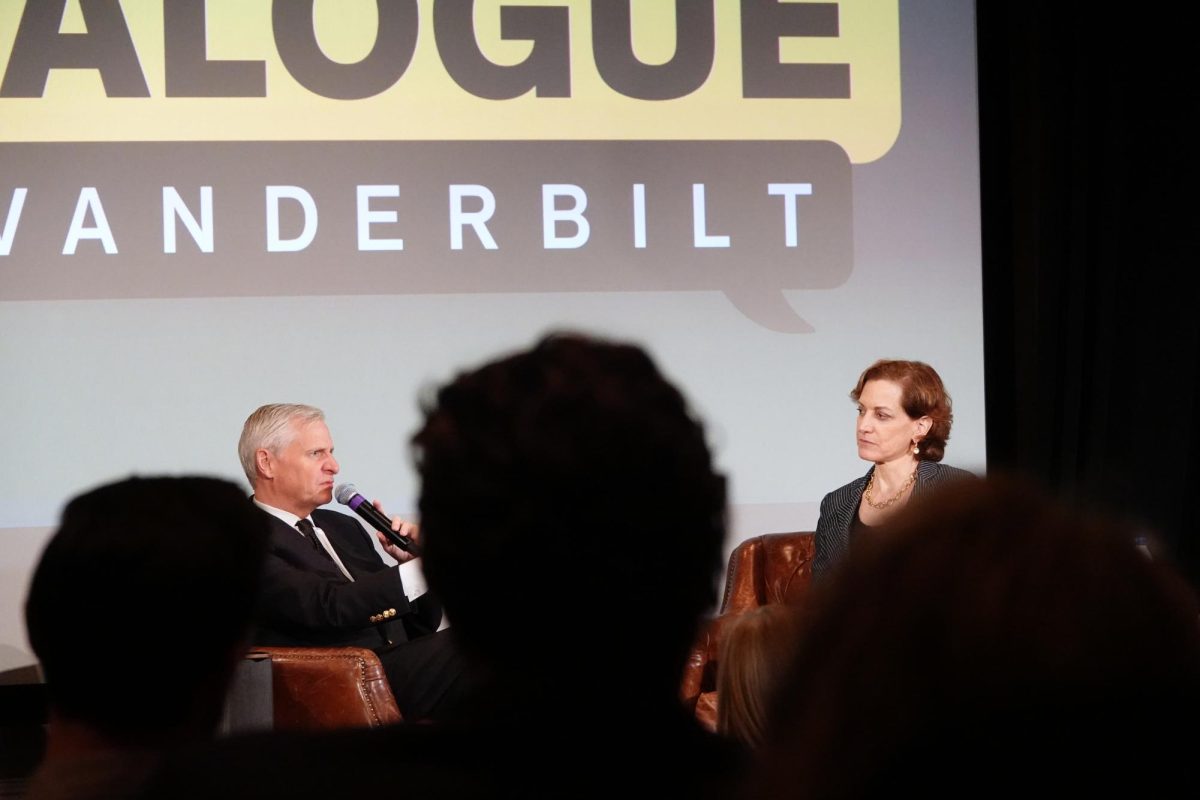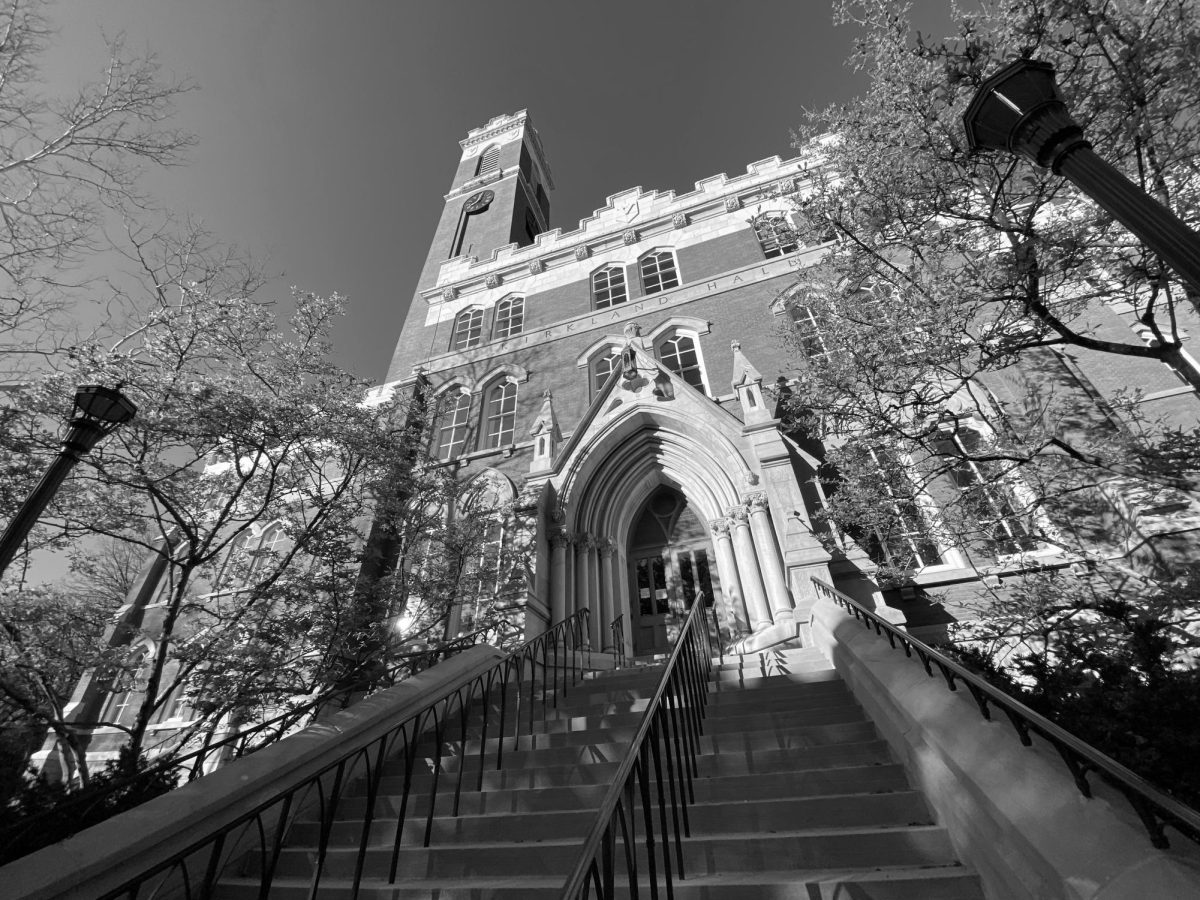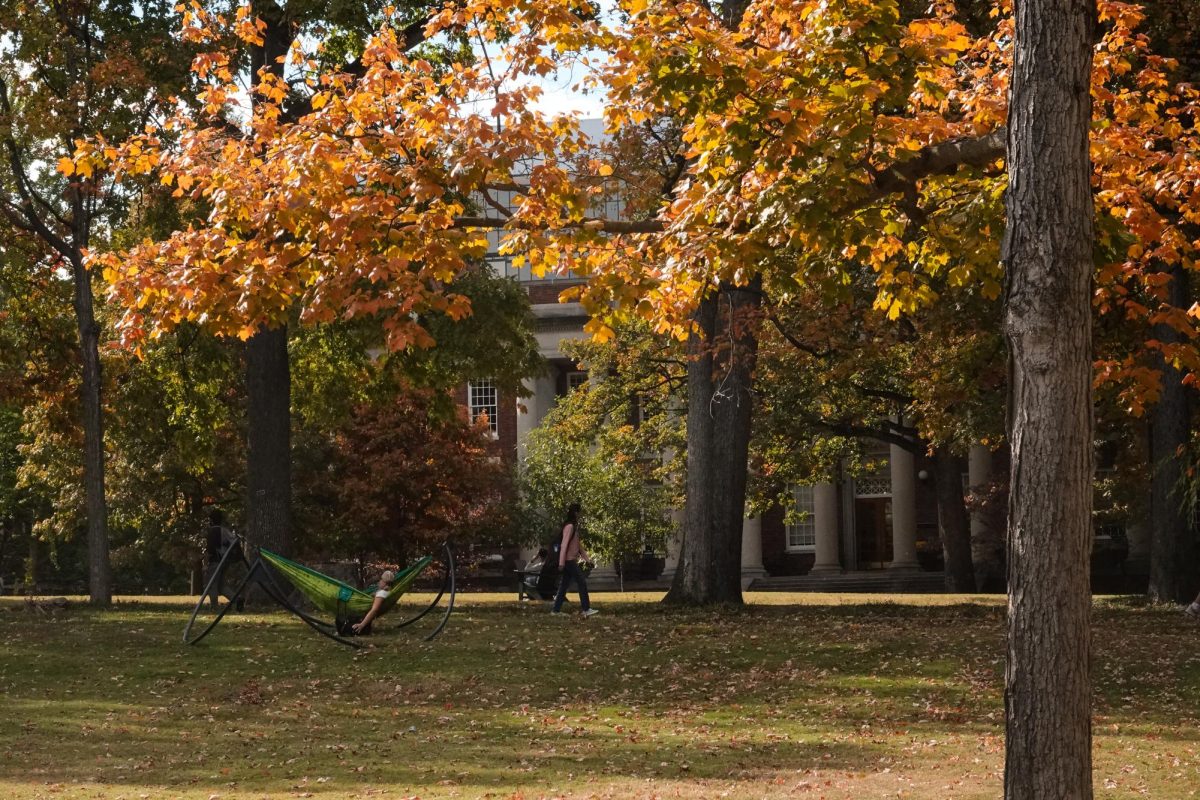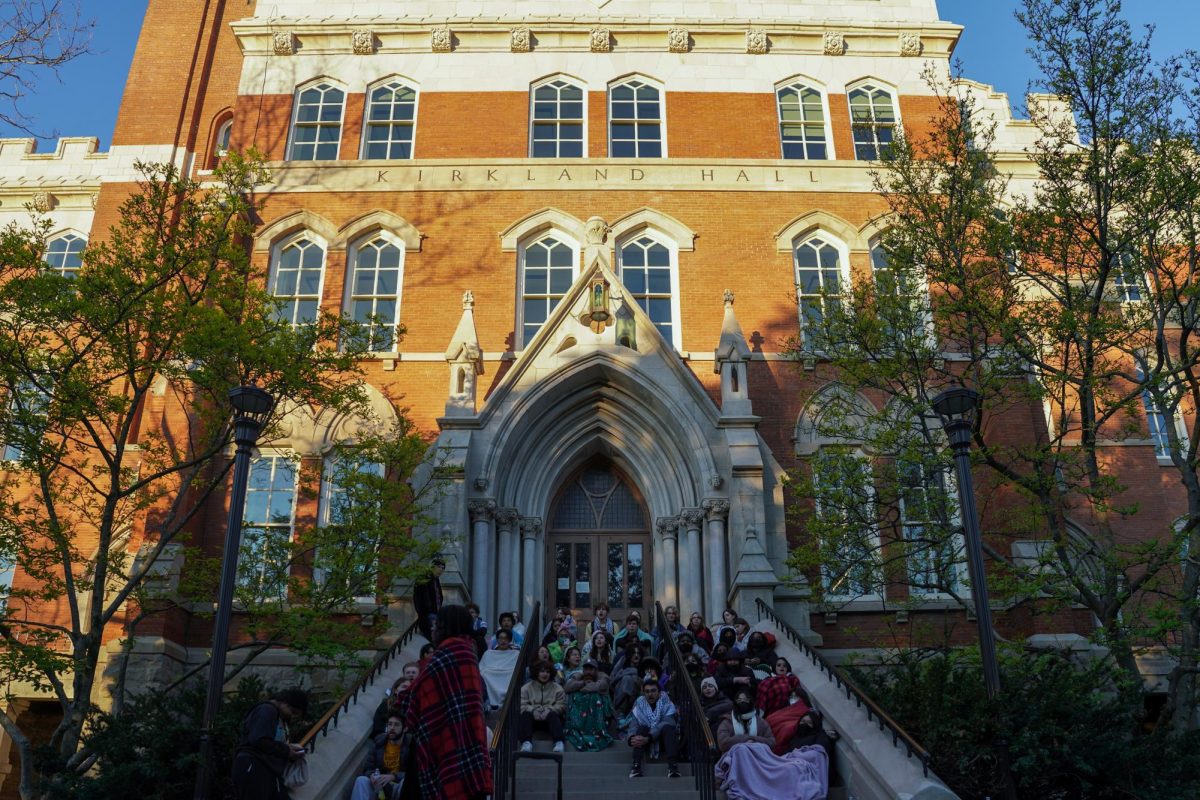The Project on Unity and American Democracy, part of Dialogue Vanderbilt, hosted Maha Elgenaidi, founder and executive director of the Islamic Networks Group, for a conversation with Divinity School Dean Yolanda Pierce on Feb. 19 in the Rothschild Black Box Theater. Monday’s talk, which focused on interfaith dialogue and the Israel-Palestine conflict, is the second in the Unity Project’s faith-based discussion series.
Elgenaidi has authored training handbooks on outreach for American Muslims and taught Islam in the modern world at Santa Clara University and the University of California at Santa Cruz. Elgenaidi received local and state recognition for her advocacy and civil rights activism, and currently holds leadership positions on several commissions and task forces addressing socio-political issues.
Chancellor Daniel Diermeier opened the discussion by outlining how conversations on religion fit with the mission of Dialogue Vanderbilt.
“Today’s gallery, as you heard, is part of a series of conversations with faith leaders that aims to provide an open forum where we can explore the intersection of faith and the pressing issues that matter to us all,” Diermeier said. “We can hear a range of perspectives and experiences through which we might come to better understand not only these issues but come to better understand one another.”
While emphasizing the university’s commitment to free expression, Diermeier acknowledged the issue of Islamophobia and antisemitism on college campuses.
“Not only are these forces antithetical to all what we stand for here at Vanderbilt, but they undermine our most essential work,” Diermeir said. “The key social purpose that universities like ours were designed to provide, namely, to serve as a platform for free expression and civil discourse, where all pupils are welcome and all ideas can be meaningfully discussed.”
Experience with religion
Pierce asked Elgenaidi to discuss her personal experience with religion and the motivation behind her faith-based activism. Elgenaidi, who grew up in Long Island, said she was raised in a secular household because her parents grew up under British-controlled Egypt.
In her search for religious identity, Elgenaidi said she visited synagogues and churches and read both the Bible and the Torah. She said that religion finally resonated with her when she started reading the Quran.
“I just happened to pick up the Quran at my sister’s home and I started reading it, and I had a religious experience,” Elgenaidi said. “That’s the only way that I can describe what happened. I had no expectations whatsoever, and I felt the book was incredible.”
After reading through the texts of various Islamic scholars, Elgenaidi said she started immersing herself in the Muslim community.
“I lived in a dominant, white culture society and didn’t realize that this entire other community existed and one thing led to another, and my motivations after reading all of this was ‘why did I not know about this?’” Elgenaidi said. “Why didn’t I know about this religion? Why didn’t my parents teach me this?”
Unlearning anti-Muslim bias
Elgenaidi said harmful stereotypes of Islam can be attributed to American popular culture and that she herself was not immune to anti-Muslim biases.
“Doing the work that I am doing I realized there was a deep-seated bias in the country, and what I didn’t realize was that I had adopted those biases myself,” Elgenaidi said. “I was a sort of self-hating Arab, a self-hating Muslim, where I actually had adopted these biases.”
Elgenaidi debunked what she views are common misconceptions about Islam, including that it is a religion of violence, discrimination against women and intolerance of other faiths. She identified education as the primary tool she uses for combating stereotypes about Islam and other religions.
“For me, countering it was through reading, through engaging with Muslims and just trying to understand this community better,” Elgenaidi said. “And it brought home everything that I was reading about other religions as well.”
Elgenaidi said that one of the aspects of Islam that really spoke to her was its theological pluralism and acceptance of other people and faiths.
“If God had wanted us all to be Muslim, he could have easily done that,” Elgenaidi said. “The fact that we are diverse is part of God’s divine will.”
Religious illiteracy
Elgenaidi segued into the topic of religious illiteracy, which she believes is prevalent in the United States. Pierce agreed, citing her own experience talking to American students who are unaware of the religious diversity of early America.
“I say to students, about 20 to 30% of enslaved Africans who came to this country were practicing Muslims, and the reason I always use that statistic is because it changes the narrative of how we think early America developed,” Pierce said.
Elgenaidi said she believes America’s innate religious pluralism has been erased by religious illiteracy, and she connected this idea to contemporary conversations surrounding religious extremism. She discussed how religious extremism is frequently viewed in Islam but not in other religions.
“I think to myself, you really need to talk about extremism in your own religions,” Elgenaidi said. “Do you recognize that you have extremist Jewish settlers in the West Bank that are doing what they’re doing right now? Hindu nationalists in India, Buddhists in Sri Lanka and Myanmar and right here, Christian nationalists.”
Interfaith dialogue and the Israel-Palestine conflict
Pierce highlighted Elgenaidi’s work on interfaith dialogue and asked her what conversations should be had regarding the conflict in Israel and Palestine. Elgenaidi said that while her work does not directly address the war, she believes both sides must agree on a two-state solution.
“[With] the efforts that are just now happening with the help of the Arab countries working with the United States and Israel, I pray to God that we get out of it a Palestinian state because that’s what we need,” Elgenaidi said. “We need a sort of two-state solution to the issue, so you do need to agree on some basic fundamentals.”
Elgenaidi reflected on how some groups and individuals have taken offense to certain slogans used to identify solidarity with Palestinian people, to which she said that interfaith discussion is required to mitigate these differences.
“I think there needs to be a meeting that happens between Jewish groups and the Muslim groups and Arab groups that are using these slogans and to have a conversation about what is meant by them, and for Jewish Americans to explain how it falls, how they receive it and to have a conversation about it,” Elgenaidi said. “We need to find ways to bring the two groups together towards peace.”
Audience Q&A, campus organizations respond
Pierce opened the floor to questions from the audience. Students associated with Chabad at Vanderbilt and Vanderbilt’s chapter of Students Supporting Israel told Elgenaidi that they reached out to Muslim organizations on campus to foster conversation but received no response.
“It’s very hard and we feel powerless, because while Oct. 7 was done onto our people, and we reached out wanting to have that dialogue, we’ve been ignored and we feel ignored and we feel targeted on campus and we don’t know how to remedy that,” a student with SSI said.
Elgenaidi asked another Jewish student if their organization had reached out to the Muslim community prior to Oct. 7, and the student said that they had not. Elgenaidi responded that not having existing relationships makes new conversations between these groups difficult, especially given the growing number of Palestinian civilians killed in the conflict.
“It’s kind of difficult to try to build those relationships today in this environment but keep trying because I think that there’s genuine desire for peace, there is a genuine desire for a solution of conflict,” Elgenaidi said. “But if you haven’t done it before, that’s probably why they didn’t respond.”
Vanderbilt’s Muslim Students Association told The Hustler it has not received communication from Chabad, Vanderbilt Hillel, SSI or ‘Dores for Israel following Oct. 7. MSA said they are willing to hold interfaith conversations but noted that communicating with separate organizations like Students for Justice in Palestine and Jewish Voice for Peace does not constitute reaching out to MSA.
“MSA would be more than happy to foster interfaith dialogue and communication between our members and those of any organizations that agree with our fundamental values of preserving human life, freedom from oppression and justice for all by standing up against the ongoing massacre of over 30,000 innocent Palestinian men, women and children,” MSA’s executive board told The Hustler.
A representative for SJP, granted anonymity for safety reasons, said the only communication attempt made was from SSI in response to a flag exhibit put on by SJP. The representative said that during this exhibit, members of SSI and other Jewish and pro-Israel groups engaged in intimidation and harassment.
“These behaviors, such as aggressively videoing our members and reporting our programming content to administration, work to prevent us from feeling comfortable and secure even within our own organization, let alone feel safe enough to engage in interorganizational dialogue with said groups,” the representative said.
The representative echoed MSA’s comments about interfaith dialogue but noted that the human rights aspect of the conflict places constraints on the types of conversations that can be had.
“However, it is important to emphasize that this is not a religious issue, but one of human rights, and so we do not believe that dialogue is equitable or productive when they occur with groups who do not recognize our humanity and the humanity of all Palestinian people,” the representative said.
During the audience Q&A, Elgenaidi also distinguished the conflict in the Middle East as a political issue, not a religious one.
“There needs to be better education about what’s happening in that part of the world and there just isn’t,” Elgenaidi said. “Palestinians have been erased or demonized in the U.S., and so that’s what we need to overcome.”
Sophomore Ochuwa Garuba, a student advisor for the Vanderbilt Project on Unity and American Democracy, said social unrest at Vanderbilt has been “less visible” than other college campuses and was therefore surprised by the tensions among religious and political groups in the audience. Garuba hopes the university will work to recognize the strife and acknowledge the humanitarian loss in Gaza.
“Even from a distance in the audience, the raw sentiment or emotion from various student org leaders was palpable,” Garuba said. “As a Unity project student advisor, I really hope the university acknowledges these tensions to provide better student support and resources to condemn the ongoing genocide in Gaza.”











